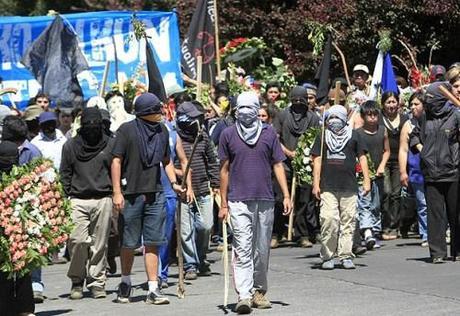Another Kind of Revolution
by John Severino / Warrior Publications

Militant Mapuches march at a funeral of one of their comrades.
In the aftermath of the inspiring popular uprising in Argentina at the end of 2001 and the battles that blocked neoliberalism in
Bolivia from 2003-2005, the Left came to power in governments across South America—most notably in Argentina, Venezuela, Brazil, and Bolivia—in a series of electoral upsets that were quickly hailed as revolutions. In hindsight, these victories prove to be less than convincing. The new revolutionary governments institutionalized social movements, turning them into mere appendages, they continued cutting down the rainforests and displacing indigenous peoples in the name of progress, they supported free trade agreements, used paramilitary or police forces against student demonstrators, expanded the exploitation of gas, oil, and coal, and imprisoned dissidents. Business as usual.
The cynicism of these new governments should not have come as a surprise. True revolutions do not happen overnight, and they are not delivered by politicians. The kind of transformation that ends exploitation, misery, and the destruction of the environment, and that allows people to organize their own lives and fulfill their needs in freedom and dignity comes about in an altogether different kind of way.
Outside of the media spotlight and the halls of power, the Mapuche are creating just such a transformation.
The Mapuche are an indigenous people of South America whose territory—Wallmapu—extends to both sides of the Andes. After the Spanish invaders arrived in the 1500s, the Mapuche won a series of wars against their would-be colonizers. Unlike their hierarchical neighbors, the Inca, the Mapuche organized horizontally, and their capacity for self-defense was so renowned that Wallmapu became known to Europeans as “The Spanish Graveyard.”
Wallmapu was not conquered until the 1880s—around the same time the US government was exterminating the last of the Great Plains warriors who had refused to accept life in the concentration camps. In a surprise attack, the states of Chile and Argentina invaded and divided up the Mapuche territories.
But the Mapuche continued to resist. Communities fought to stay together through the first wave of invasion and dispossession. They preserved their language, religion, food culture, and medicinal knowledge. They held on to whatever land they could, though they were often reduced to working as peons for the big landlords that had usurped their territory. In the 1970s, the progressive Allende government had consolidated a great quantity of public land and was preparing to dole it out as individual plots to poor Chileans. This would have eased the poverty of the urban poor, but it might also have spelled the end of the Mapuche and their collective system, in which land is not a commodity but the inheritance of the entire community.

